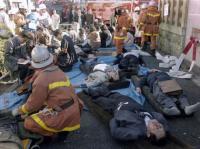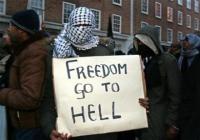-
ISIS has changed international law

Two years ago, virtually no one had heard of the Islamic State of Iraq and Syria (ISIS). In a January 2014 New Yorker interview, President Obama dismissed the group as “Junior Varsity.” Since then, ISIS has emerged as one of the most wealthy, powerful, and dangerous terrorist organizations that ever existed. UN Security Council Resolution 2249, adopted in November 2015, will likely be viewed as confirming that use of force in self-defense is now permissible against “nonstate actors” such as terrorists when the territorial state is unable to suppress the threat that they pose. The implication of this newly accepted change in the international law of self-defense is that any nation can now lawfully use force against deadly nonstate actors in another country if the government of that country is unable or unwilling to suppress the threat within its borders. With so many potential targets in so many countries – the U.S. terrorist organizations list, for example, includes fifty-eight terrorist groups headquartered in thirty-five different countries (in addition to ISIS in Syria/Iraq) — one must ask whether the possibility of abuse will ultimately outweigh the benefits of weakening ISIS.
-
-
Dozens of Gitmo prisoners to be transferred to other countries in the next two weeks
The United States plans to move out a dozen inmates from Guantanamo Bay in the next few weeks, part of the final push by President Barack Obama to shut down the facility. Obama, since his election to the presidency, has said he wants to transfer the men to their home countries, or to maximum security prisons in the United States.
-
-
EU cities have 900 “no-go zones”: Hungary’s government
Hungary’s right-wing government, ahead of a national referendum on the question of EU-mandated refugee quotas for EU member states, has claimed in a Web site post which supports the government’s anti-migration stance, that there are 900 “no-go zones” in London, Paris, Stockholm, and Berlin. The government Web page, entitled “We say no to mandatory migrant quotas,” defines the 900 “no-go zones” as “neighborhoods not under control, or hardly kept under control,” where “the norms of the host society … barely prevail.”
-
-
Is Belgium’s nuclear security up to scratch?
Belgium’s counter-terrorism efforts are once again being called into question following the recent tragedies in Brussels. The attacks were carried out against soft targets – the public check-in area of Brussels Airport and Maelbeek metro station – but a series of unusual and suspicious occurrences were also reported at nuclear facilities in the country. These events highlight the very real threat to nuclear facilities. For Belgium, this recent episode is one item on a long list of security concerns. Based on this history, the Belgian authorities should be primed to take nuclear security especially seriously. But there are serious questions about whether they are.
-
-
Montenegro expels 58 members of Japanese doomsday cult Aum Shinrikyo

Montenegro has expelled fifty-eight foreigners, all members of the Japanese doomsday cult Aum Shinrikyo which, in March 1995, launched a deadly nerve gas attack on Tokyo’s underground. Twelve people were killed and thousands injured in Aum Shinrikyo’s nerve gas attack on a Tokyo commuters.
-
-
Sen. Wyden said he would filibuster efforts to mandate back doors

Senator Ron Wyden (D-Oregon), a critic of the NSA domestic spying programs, said he would filibuster any attempt by fellow lawmakers to require U.S. technology companies to weaken the encryption systems with which they equip their devices. Referring to Apple fight against a court order requiring the company to relax the encryption of iPhone used by the two San Bernardino terrorists, Wyden said that consumers were asking: “Are these for the privacy rights of the dead terrorist?”
-
-
French government abandons plan to strip terrorists of French citizenship
The French government has decided to abandon plans to strip convicted terrorists with dual nationality of their French citizenship and deport them.French president Francois Hollande also wanted to make the state of emergency, which gives the police special powers and which was imposed for three months after the November attacks, a permanent feature of the constitution, but the government was forced to abandon this proposal, too, in the face of stiff opposition.
-
-
Populist German party calling for banning construction, operation of mosques
A 45-page draft policy proposal, to be debated at the end of April at the annual conference of the AfD (Alternative für Deutschland),a populist, anti-immigration party which has been gaining in the polls, would prohibit the “construction and operation of mosques.” The policy draft, titled “Courage to take responsibility,” states that “Islam does not belong to Germany.” Mosques are conducive “not only to common prayer, but also to the spread of Islamic teachings directed towards the removal of our legal order,” the draft says.
-
-
American Airlines cancels all Brussels flights until 7 April
American Airlines announced it has canceled all flights to and from Brussels until 7 April. The carrier’s decision is in response to the 22 March suicide bombing attack at the Brussels airport. The explosion occurred near the American Airlines counter, and some of the thirty-two people killed in the blast were about to board an AA flight.
-
-
FBI cracks terrorists’ iPhone without Apple's help
The Justice Department on Monday asked a court to withdraw the government’s request that the court order Apple to help the FBI gain access to the encrypted iPhone used by the San Bernardino terrorists. The Justice Department filed the request after the FBI had successfully accessed data stored on an encrypted iPhone. The FBI wanted the court to compel Apple to relax the 10-attempt limit, which is part of the encryption system which comes with the device. If there are more than ten attempts to guess the password, the phone locks forever and all the data on it is wiped out. The FBI argued that its computers, using brute-force, would be able to break the phone’s password, but that it would take more than ten attempts.
-
-
ISIS “advanced plans” to attack Jewish children in Turkey thwarted

Isis has developed plans to carry out a terror attacks targeting Jewish children in Turkey, according to intelligence officials. Six operatives from the terror group, arrested in the Turkish city of Gaziantep last week, told Turkish investigators about an “imminent” attack against Jewish children. Istanbul’s synagogue in Beyoglu was one of the attacks. The synagogue operates a community center and a school.
-
-
Views of millions of Muslims “fundamentally incompatible with the modern world”: Tony Blair

Former British prime minister Tony Blair has said that “many millions” of Muslims hold a viewpoint which is “fundamentally incompatible with the modern world.” In comments he made over the weekend, Blair rejected arguments that ISIS is merely “tens of thousands of brainwashed crazies,” saying: “[ISIS] does not seek dialogue but dominance. It cannot therefore be contained. It has to be defeated.”
-
-
American Airlines cancels all Brussels flights until 7 April

American Airlines announced it has canceled all flights to and from Brussels until 7 April. The carrier’s decision is in response to the 22 March suicide bombing attack at the Brussels airport. The explosion occurred near the American Airlines counter, and some of the thirty-two people killed in the blast were about to board an AA flight.
-
-
Proposed bill would ban “burner” phones in the U.S.

Much of the recent debate revolved around terrorists using devices with end-to-end encryption. The terrorists who perpetrated the 13 November 2015 attacks in Paris used several encrypted phones – but three of them also used burner phones, concealing their communications by not having the owners’ names associated with the phones they used. Representative Jackie Speier (D-California) has proposed a bill which would ban burner phones in the United States.
-
-
Belgium has divided and decentralized itself almost out of existence

The 22 march Brussels bombings have called attention to the crisis of security across Europe in the face of terrorism and radicalization. But the incidents also add color to the image of Belgium as a failed nation-state, one that seems egregiously incapable of protecting its own people. As it is, Belgium is no longer a nation-state in any functional sense, but rather a “federation” of three different regions and of three different “linguistic communities.” As a result, it is host to an array of police and juridical districts that don’t map onto each other geographically, demographically, or politically. If Belgians don’t imagine a way to reinvent themselves as a functioning nation-state, despite their linguistic and other differences, the consequences could be dire indeed. Without a state strong enough to keep all its people safe, and cohesive enough to include all its divergent populations as citizens of a common polity, the forces behind what happened in Brussels on 22 March will only fester and grow.
-
More headlines
The long view
Preventing Another 'Jan. 6' Starts by Changing How Elections Are Certified, Experts Say
The 2024 presidential election may be a rematch between President Joe Biden and former President Donald Trump, but preventing a repeat of Jan. 6, 2021 — when false claims of a stolen election promoted by Donald Trump and his allies led to an insurrection at the U.S. Capitol —will be top of mind this election year. Research finds broad support among public for nonpartisan certification commissions.
States Rush to Combat AI Threat to Elections
This year’s presidential election will be the first since generative AI became widely available. That’s raising fears that millions of voters could be deceived by a barrage of political deepfakes. Congress has done little to address the issue, but states are moving aggressively to respond — though questions remain about how effective any new measures to combat AI-created disinformation will be.
Chinese Government Hackers Targeted Critics of China, U.S. Businesses and Politicians
An indictment was unsealed Monday charging seven nationals of the People’s Republic of China (PRC) with conspiracy to commit computer intrusions and conspiracy to commit wire fraud for their involvement in a PRC-based hacking group that spent approximately 14 years targeting U.S. and foreign critics, businesses, and political officials in furtherance of the PRC’s economic espionage and foreign intelligence objectives.
European Arms Imports Nearly Double, U.S. and French Exports Rise, and Russian Exports Fall Sharply
States in Europe almost doubled their imports of major arms (+94 per cent) between 2014–18 and 2019–23. The United States increased its arms exports by 17 per cent between 2014–18 and 2019–23, while Russia’s arms exports halved. Russia was for the first time the third largest arms exporter, falling just behind France.
LNG Exports Have Had No Impact on Domestic Energy Costs: Analysis
U.S. liquified natural gas (LNG) exports have not had any sustained and significant direct impact on U.S. natural gas prices and have, in fact, spurred production and productivity gains, which contribute to downward pressure on domestic prices.
Don’t Buy Moscow’s Shameless Campaign Tying Biden to Its Terrorist Attack
Russia has offered many different explanations to the ISIS-K’s 22 March 2024 terrorist attack at the Crocus City Hall in Moscow, but the most recent explanation offered by Russia is the most audacious yet: Russia now charges that the Ukrainian energy company Burisma financed the attack. Burisma is at the center of an effort by a congressional committee to impeach President Biden, but the case has all but collapsed. Hunter Stoll writes that Russia’s disinformation and propaganda apparatus appears to be searching for ways to keep Burisma in the news ahead of the U.S. presidential election.
